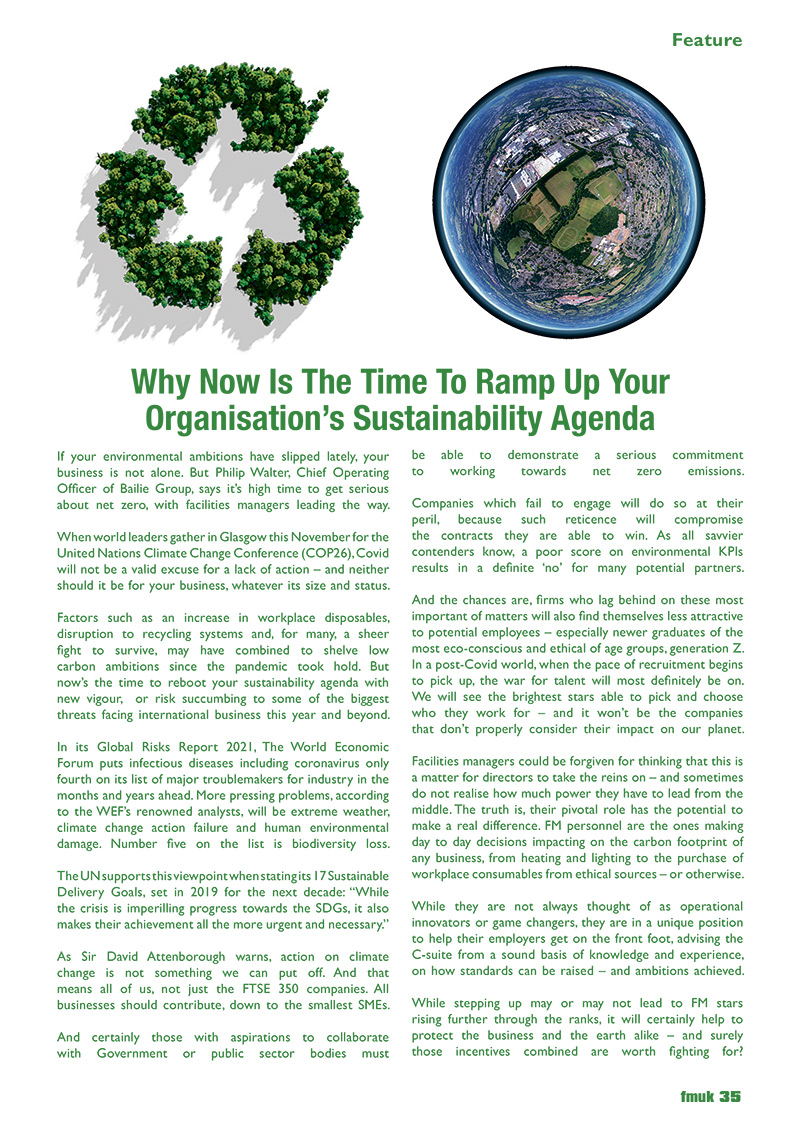Why Now Is The Time To Ramp Up Your Organisation’s Sustainability Agenda
 If your environmental ambitions have slipped lately, your business is not alone. But Philip Walter, Chief Operating Officer of Bailie Group – a 158-year-old progressive family-owned firm of communications specialists – says it’s high time to get serious about net zero, with facilities managers leading the way.
If your environmental ambitions have slipped lately, your business is not alone. But Philip Walter, Chief Operating Officer of Bailie Group – a 158-year-old progressive family-owned firm of communications specialists – says it’s high time to get serious about net zero, with facilities managers leading the way.
When world leaders gather in Glasgow this November for the United Nations Climate Change Conference (COP26), Covid will not be a valid excuse for a lack of action – and neither should it be for your business, whatever its size and status.
Factors such as an increase in workplace disposables, disruption to recycling systems and – for many – a sheer fight to survive, may have combined to shelve low carbon ambitions since the pandemic took hold.
But now’s the time to reboot your sustainability agenda with new vigour – or risk succumbing to some of the biggest threats facing international business this year and beyond.
In its Global Risks Report 2021, The World Economic Forum puts infectious diseases including coronavirus only fourth on its list of major troublemakers for industry in the months and years ahead.
More pressing problems, according to the WEF’s renowned analysts, will be extreme weather, climate change action failure and human environmental damage. Number five on the list is biodiversity loss.
The UN supports this viewpoint when stating its 17 Sustainable Delivery Goals, set in 2019 for the next decade: “While the crisis is imperilling progress towards the SDGs, it also makes their achievement all the more urgent and necessary.”
As Sir David Attenborough warns, action on climate change is not something we can put off. And that means all of us, not just the FTSE 350 companies. All businesses should contribute, down to the smallest SMEs.
And certainly those with aspirations to collaborate with Government or public sector bodies must be able to demonstrate a serious commitment to working towards net zero emissions.
Companies which fail to engage will do so at their peril, because such reticence will compromise the contracts they are able to win. As all savvier contenders know, a poor score on environmental KPIs results in a definite ‘no’ for many potential partners.
And the chances are, firms who lag behind on these most important of matters will also find themselves less attractive to potential employees – especially newer graduates of the most eco-conscious and ethical of age groups, generation Z.
In a post-Covid world, when the pace of recruitment begins to pick up, the war for talent will most definitely be on. We will see the brightest stars able to pick and choose who they work for – and it won’t be the companies that don’t properly consider their impact on our planet.
Facilities managers could be forgiven for thinking that this is a matter for directors to take the reins on – and sometimes do not realise how much power they have to lead from the middle.
The truth is, their pivotal role has the potential to make a real difference. FM personnel are the ones making day to day decisions impacting on the carbon footprint of any business, from heating and lighting to the purchase of workplace consumables from ethical sources – or otherwise.
While they are not always thought of as operational innovators or game changers, they are in a unique position to help their employers get on the front foot, advising the C-suite from a sound basis of knowledge and experience, on how standards can be raised – and ambitions achieved.
While stepping up may or may not lead to FM stars rising further through the ranks, it will certainly help to protect the business and the earth alike – and surely those incentives combined are worth fighting for?
























































